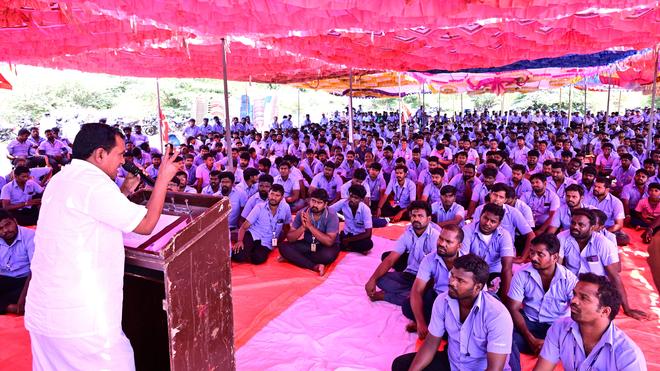Samsung Workers Register Union at Tamil Nadu Plant Amid Labor Rights Push
Workers Seek Better Conditions and Representation in India’s Manufacturing Sector

In a landmark move, employees at Samsung’s Tamil Nadu manufacturing plant have officially registered a workers’ union, signaling a significant shift in labor rights within India’s growing tech and electronics sector. The unionization effort is seen as a response to long-standing concerns regarding working conditions, wages, and worker benefits in the fast-expanding manufacturing industry.
Workers’ Push for Representation
The Samsung plant in Tamil Nadu, one of the company’s largest facilities in India, has become a focal point for labor rights activism. Employees at the plant, which produces a variety of Samsung’s mobile phones and other electronic devices, have raised concerns over long working hours, lack of job security, and insufficient employee welfare measures. As a result, workers have come together to form the union, aiming to secure better wages, healthcare benefits, and improved workplace safety.
The registration of the union is a pivotal step in empowering the workforce, as it provides employees with a legal structure through which they can voice their grievances and negotiate terms with management. This development comes amidst growing labor unrest in India’s manufacturing sector, as workers demand more from employers amid rising inflation and cost of living.
Reaction from Samsung and Authorities
Samsung has expressed its commitment to improving employee welfare, stating that it values the well-being of its workers. However, the company has yet to make a formal statement about the formation of the union. While labor unions in India are not uncommon, especially in sectors such as textiles and automobiles, the formation of one within the tech industry represents a shift in the dynamic between workers and multinational companies operating in the country.
The Tamil Nadu government has welcomed the development, viewing it as a sign of progress for workers’ rights. Local authorities are also keen to ensure that the unionization process does not lead to any industrial unrest, and that the interests of both workers and employers are balanced.
Implications for Labor Rights in India
The registration of the Samsung workers’ union at the Tamil Nadu plant is expected to serve as a model for other factories in India’s tech industry. The move could encourage similar efforts in other manufacturing plants where workers have been dissatisfied with their conditions but lacked the organizational framework to address their concerns. With India becoming a key hub for global manufacturing, especially in the electronics and mobile sectors, the establishment of such unions could reshape labor relations in the industry.
Experts believe that the success of the union at Samsung could potentially set a precedent for workers in other multinational companies operating in India, leading to a more equitable approach to labor rights in the sector. This could also prompt discussions on improving labor laws in India, ensuring that workers have a stronger voice in their workplaces.
Challenges Ahead for the Union
Despite the optimistic outlook, the union faces several challenges in achieving its goals. One of the primary hurdles will be negotiating with a powerful multinational corporation like Samsung, which has vast resources and legal expertise at its disposal. Additionally, there are concerns about the potential for retaliation against union leaders or members, which could deter workers from fully participating in union activities.
Moreover, labor laws in India have been historically skewed towards employers, and while recent reforms have aimed to improve conditions for workers, many experts argue that more needs to be done to level the playing field. The union will have to navigate this complex legal environment, which could prove to be an uphill battle.
Global Context and the Future of Labor Movements in India
India’s manufacturing sector has long faced criticism for its treatment of workers, particularly in multinational corporations. As global companies increasingly outsource production to India, there has been growing pressure for these companies to adhere to international labor standards. The Samsung workers’ union is part of a larger trend of growing labor activism in developing economies, where workers are demanding better conditions and fair compensation for their labor.
The outcome of this union’s formation could have a ripple effect across the industry. If successful, it may encourage a wave of unionization efforts in other tech and manufacturing sectors, driving a broader labor movement that could push for stronger labor protections in India.






